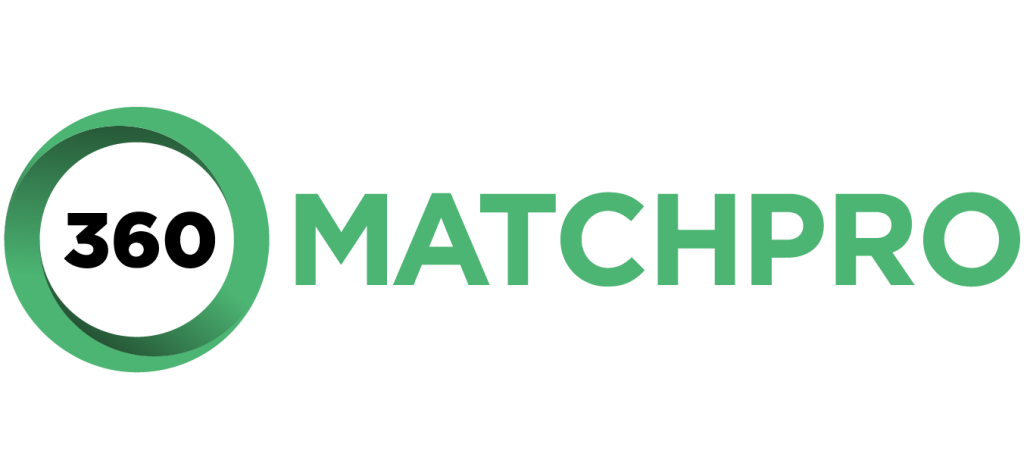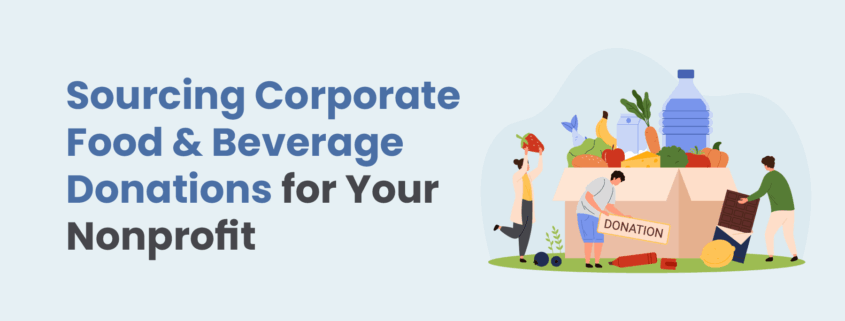Sourcing Corporate Food & Beverage Donations for Your Nonprofit
Food and beverage donations are crucial in bolstering the mission and operations of numerous nonprofit organizations. These in-kind contributions not only address immediate needs but also allow nonprofits to channel more resources into program development and community outreach. Mastering the art of sourcing these donations can significantly enhance a nonprofit’s ability to serve its beneficiaries. And that’s where this guide comes in! We’ll cover:
- The Value of Food & Beverage Donations for Nonprofits
- Why Companies Are a Great Source of Food & Beverage Donations
- How to Get Food & Beverage Donations From Businesses
- 5 Companies That Provide Food & Beverage Donations to Nonprofits
Nonprofits that successfully secure food and beverage donations often find themselves better positioned to offer essential services such as meal programs, event catering, and emergency relief efforts. By leveraging corporate generosity, organizations can cut operational costs and amplify their overall impact, fostering a sustainable model for ongoing community support. Let’s begin.
The Value of Food & Beverage Donations for Nonprofits
Food and beverage donations are foundational for many nonprofits, particularly those focused on hunger relief, shelter services, and community events. These donations provide tangible resources that directly support the well-being of individuals and families in need. By receiving food and beverage items from corporate donors, nonprofits can extend their budgets further and redirect funds toward other critical areas such as education, healthcare, or housing assistance.
Beyond immediate operational benefits, food and beverage donations contribute to sustainability efforts by reducing food waste. Companies often have surplus inventory or products nearing expiration that would otherwise be discarded. Partnering with nonprofits to redirect these items supports environmental responsibility while addressing food insecurity. Additionally, these donations can strengthen a nonprofit’s capacity by enabling larger-scale programming and outreach, ultimately amplifying their social impact.
From the donor’s perspective, contributing food and beverage items aligns with corporate social responsibility (or CSR) goals. It offers companies a meaningful way to engage with their communities, enhance their brand reputation, and foster employee pride through volunteerism and giving. This strategic value creates a win-win scenario where nonprofits gain essential resources and companies fulfill their commitment to social good.
Use Case: Supporting Shelters with Food Donations
Consider a nonprofit shelter that partners with a local grocery chain to receive weekly donations of fresh produce, dairy, and packaged goods. This steady supply ensures that residents have access to balanced meals, improving health outcomes and overall satisfaction. The grocery chain benefits by reducing waste and demonstrating community leadership, while the shelter can allocate saved funds toward expanding its services.
Use Case: Enhancing Fundraising Events with Beverage Donations
Another example involves a nonprofit organizing an annual gala that secures beverage donations from a regional beverage distributor. These contributions help lower event costs, allowing more funds to be raised to support the nonprofit’s mission. The distributor gains visibility among attendees and strengthens its community ties, showcasing its commitment to local causes.
Why Companies Are a Great Source of Food & Beverage Donations
Businesses are often well-positioned to provide food and beverage donations due to their operational needs and corporate social responsibility initiatives. Many companies experience excess inventory, seasonal surpluses, or product closeouts that can be redirected to nonprofits rather than being wasted. This creates an opportunity for businesses to contribute meaningfully while managing their resources efficiently.
Corporate giving programs frequently include food and beverage donations as part of their community engagement strategies. Companies recognize that supporting local nonprofits enhances their brand image and fosters goodwill among customers and employees alike. Employee engagement programs may also encourage staff to participate in donation drives or volunteer at nonprofit events, further strengthening the partnership.
The mutual value of these donations is clear. Nonprofits receive essential goods that support their programs and events, while companies gain positive recognition and deepen their community connections. This symbiotic relationship helps build a culture of giving that benefits all stakeholders involved.
How to Get Food & Beverage Donations From Businesses
Securing food and beverage donations from companies requires a strategic approach that aligns the nonprofit’s needs with the interests and capabilities of potential donors. Here’s how you can manage the process.
Identifying the Right Business Partners
The first step is identifying businesses whose products or services complement the nonprofit’s mission and operational requirements. This targeted approach increases the likelihood of successful partnerships.
Research local food producers, distributors, restaurants, and beverage companies that have a history of community involvement. Understanding their product lines and donation policies can help tailor your outreach and increase success rates.
Crafting Effective Outreach Messages
When reaching out, it is essential to clearly articulate the nonprofit’s needs, how the donated items will be used, and the impact they will have on the community. Providing specific examples and data can help demonstrate the tangible benefits of the donation. Additionally, showing alignment with the company’s CSR or community engagement goals makes the request more compelling. Personalizing messages to reflect the company’s values and CSR objectives can create stronger connections.
Maintaining Donor Relationships
Building and maintaining strong relationships with corporate donors is equally important. Publicly acknowledging donations through social media, newsletters, or event signage offers recognition that companies appreciate. Regular communication and updates on the impact of their contributions help foster ongoing support and pave the way for future collaborations.
Express gratitude promptly and publicly when appropriate. Share stories and outcomes related to the donations, and invite donors to events or volunteer opportunities. Consistent engagement fosters trust and cultivates long-term partnerships.
5 Companies That Provide Food & Beverage Donations to Nonprofits
Many food and beverage companies understand the importance of giving back to the community. Whether it’s providing fresh produce, pantry staples, or beverages, these companies contribute essential resources to nonprofits, helping organizations feed and support individuals and families in need. Here are five companies that regularly donate food and beverage items to nonprofits:
1. Whole Foods Market
Whole Foods Market has long been recognized for its commitment to sustainability, health, and community engagement. As part of its philanthropic efforts, the company donates fresh produce, dairy, and other food items to local nonprofits. Their goal is to ensure that nutritious, high-quality food is accessible to those in underserved communities. Whole Foods Market partners with food banks, shelters, and other charitable organizations to provide healthy options for individuals and families facing food insecurity.
What They Donate: Fresh produce, dairy products, dry goods, and prepared foods.
How to Access Donations: Whole Foods Market works with local nonprofits, so reaching out to store managers or corporate representatives for regional partnerships is a good first step.
Learn More: You can explore their community outreach efforts through their website or inquire directly with your local Whole Foods Market about specific donation programs.
2. Coca-Cola
Coca-Cola is one of the world’s largest beverage companies, and it plays an active role in supporting community causes. Coca-Cola regularly donates a variety of beverages, including sodas, juices, and bottled water, to nonprofit events, conferences, and fundraisers. These donations help enhance the attendee experience while simultaneously supporting causes that focus on health, education, and community well-being. Coca-Cola’s global reach and distribution network enable it to contribute to a wide range of nonprofit initiatives.
What They Donate: Soft drinks, bottled water, juices, and other beverages.
How to Access Donations: Coca-Cola often works with nonprofits to provide beverage donations for specific events or campaigns. Contacting their local or national offices and inquiring about their donation process is the best way to start.
Learn More: Visit Coca-Cola’s website to find out more about their community programs and how to apply for donations.
3. General Mills
General Mills, known for its wide array of packaged foods, has a long-standing commitment to food security. They partner with nonprofits to provide surplus packaged goods, snacks, and breakfast items. These donations support hunger relief efforts, community food banks, and meal programs that aim to alleviate food insecurity in local communities. Their contributions help fill pantry shelves and provide vital meals to vulnerable populations, including children, seniors, and families experiencing hardship.
What They Donate: Packaged snacks, breakfast cereals, canned goods, and other non-perishable food items.
How to Access Donations: General Mills collaborates with national and local organizations to distribute food donations. Nonprofits can reach out to their corporate social responsibility team or contact regional offices to inquire about donation programs.
Learn More: Explore General Mills’ social responsibility initiatives on their website, where they detail their efforts to support food security and community well-being.
4. Panera Bread
Panera Bread is known for its commitment to quality food and its strong focus on giving back to communities. The company donates freshly baked goods (such as bread, pastries, and other bakery items) to local shelters, food banks, and community centers. These donations help reduce food waste while providing nourishment and comfort to those in need. Panera’s “Day-End Dough-Nation” program allows unsold baked goods to be distributed to local organizations, making it a valuable resource for nonprofits serving communities experiencing food insecurity.
What They Donate: Freshly baked bread, pastries, and other bakery items.
How to Access Donations: Panera Bread’s donations are typically coordinated through local stores. Nonprofits can contact nearby Panera locations to inquire about receiving donations or participating in their Day-End Dough-Nation program.
Learn More: Panera’s website provides more information on their community outreach programs and how to get involved with their donations.
5. Sysco
Sysco, a global leader in food distribution, plays a key role in supplying food to a wide range of industries, including nonprofits. Sysco partners with nonprofit organizations to donate surplus catering items, such as prepared meals, pantry staples, and other food products. These donations are particularly beneficial for large-scale events, community gatherings, and food distribution programs. By providing high-quality food at no cost, Sysco helps nonprofits reduce event costs and serve more individuals.
What They Donate: Prepared meals, catering items, and other food products.
How to Access Donations: Sysco often works with local charities and event organizers. Nonprofits can contact Sysco’s regional branches to inquire about donation opportunities or explore partnership programs.
Learn More: Sysco’s website outlines their charitable giving programs and community initiatives, offering insights into how organizations can partner with them for food donations.
Wrapping Up & Next Steps
Food & Beverage donations offer nonprofits a powerful resource to enhance their programs, reduce costs, and increase community impact. These contributions not only address immediate needs but also support sustainability and capacity-building efforts. Companies, motivated by CSR goals and operational efficiencies, are ideal partners in providing this vital support.
Nonprofits are encouraged to actively identify potential corporate donors, craft thoughtful outreach strategies, and nurture ongoing relationships. By doing so, they can unlock a steady stream of in-kind food and beverage donations that strengthen their mission and expand their reach. Taking these steps with confidence and clarity will position nonprofits for greater success in serving their communities.
Unlock More Support with the Right Tools
Finding the right in-kind sponsors can be challenging, but Double the Donation makes the process easier. Interested? Our platform provides you with access to the most comprehensive corporate giving database, empowering you to quickly identify companies offering in-kind donations, grants, and other valuable resources.
Whether you’re organizing a gala, community event, or school initiative, Double the Donation helps you source the in-kind support you need so you can focus on what matters: delivering meaningful impact.
Source more in-kind donations with the right tools. Request a demo of Double the Donation today!



